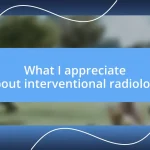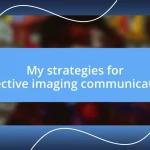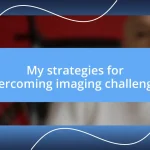Key takeaways:
- Ethical dilemmas often involve a conflict between personal values and external pressures, prompting deep self-reflection on one’s integrity and priorities.
- Real-life examples, like addressing workplace negativity or making compromises for promotions, highlight the importance of aligning actions with core principles.
- Everyday ethical choices, even seemingly small ones, can foster a stronger sense of community and inspire others to prioritize empathy and integrity in their decisions.

Understanding ethical dilemmas
An ethical dilemma is essentially a situation where one has to make a choice between two conflicting moral principles. I remember a time when a colleague found himself caught between reporting a minor violation at work or staying silent to preserve team harmony. Although the violation felt small, his internal struggle was immense—was loyalty to team worth compromising his integrity?
When facing these dilemmas, emotions run high. It’s like standing at a crossroads, where every path represents not only a choice but also potential consequences for ourselves and others. I’ve often wondered, what would I feel if I chose the wrong path? The weight of that uncertainty can be paralyzing and deeply personal, leading us to question our values and priorities.
As I navigated my own ethical dilemmas, I learned that clarity often arises from introspection. For instance, reflecting on past experiences helped me recognize patterns in my decision-making. It made me realize that understanding our emotions and values is crucial; how else can we make choices that align with our true selves? These moments challenge us to examine what we stand for, making the journey both a struggle and a profound learning experience.

Common scenarios of ethical dilemmas
Ethical dilemmas often arise in everyday situations, where we find ourselves torn between doing what is right and the pressures or expectations of others. I can recall a time when I was asked to cover for a coworker who frequently came in late. While it was tempting to protect her from potential consequences, I couldn’t shake the feeling that this might set a poor precedent. It highlighted how seemingly minor choices could ripple out and affect the integrity of our workplace culture.
Here are some common scenarios that often lead to ethical dilemmas:
- Whistleblowing: Deciding whether to report unethical behavior in the company, knowing it could lead to backlash.
- Resource Allocation: Choosing how to distribute limited resources in a way that benefits some but possibly harms others.
- Confidentiality Breaches: Struggling with the decision to disclose sensitive information while considering the potential harm it could cause.
- Social Media Posts: Navigating the fine line between freedom of expression and professional responsibilities—should you share controversial opinions?
- Family vs. Duty: Balancing loyalty to family members with ethical obligations at work that might conflict with personal relationships.
Each of these scenarios carries emotional weight, often leaving us feeling vulnerable and questioning our values. In my experience, facing these dilemmas requires not just an assessment of what is right but a deep dive into what kind of person I want to be and how I wish to be perceived by others.

Personal impact of ethical dilemmas
Ethical dilemmas can leave a profound mark on our personal lives. I remember grappling with a tough decision when I was prompted to compromise my values for a promotional opportunity. The internal conflict was palpable—on one hand, I craved the recognition and financial benefit, while on the other, I knew that bending the rules could tarnish my reputation. In those moments, I truly learned the weight that ethical choices can carry; it’s not just about making a decision but understanding how it shapes who we are.
Emotions often intertwine with these ethical choices, turning them into emotionally charged challenges. A while back, I faced a situation where I overheard a friend gossiping about another mutual friend. Instead of staying silent, I felt compelled to intervene, worrying about possible fallout in our friend group. This seemingly small action left me feeling anxious, yet more aligned with my values about honesty and friendship. Those choices are a mirror, reflecting our true selves and the principles we hold dear.
Navigating through the aftermath of these dilemmas requires emotional resilience and reflection. I recall facing criticism after voicing my concerns about a proposal at work that seemed unjust. Although it was uncomfortable, I realized that the discomfort was a necessary step in standing up for my values. These experiences are pivotal; they challenge us to evaluate our morals against the backdrop of possible consequences, leading to personal growth and a clearer understanding of our ethical compass.
| Aspect | Personal Experience |
|---|---|
| Decision Weight | Struggled between integrity and ambition when offered a promotion for unethical behavior. |
| Emotional Strain | Felt anxious yet empowered after confronting a friend’s gossip. |
| Outcome Reflection | Learned the importance of standing firm in my values, even under criticism. |

Decision-making process in dilemmas
When faced with ethical dilemmas, the decision-making process often feels like a labyrinth. I remember a time when I had to choose between supporting a friend or upholding my responsibility as a team member. It was one of those moments where my heart raced, and I felt torn—did I prioritize my loyalty, or did I need to consider the bigger picture of the group’s well-being? Each path seemed paved with consequences, reminding me that decisions in dilemmas often reveal our core values.
As I mulled over the options, I found myself diving deeper into self-reflection. What did my choice say about who I am? In one particularly challenging situation at work, I had to decide whether to stay silent about a colleague’s unethical practices. This wasn’t just about the immediate repercussions; it was a matter of integrity that could shape my professional identity. I remember the weight of that internal struggle vividly—it was as if I could feel the tug-of-war within my mind. Ultimately, I chose to speak up, a decision that reaffirmed my commitment to honesty, even though it came with risks.
Looking back, I see that these moments of decision are not just about the dilemma itself. They’re poignant lessons that push us to examine our beliefs and fears. Have you ever considered how your decisions shape your future? I certainly did, and it led me to understand that ethical dilemmas are less about finding a “right” answer and more about asking ourselves what kind of person we aspire to be. Each decision is a brushstroke on the canvas of our character, creating a portrait only we can define.

Examples from personal experience
I recall a significant moment when I was volunteering for a charity event and discovered that some funds were being mismanaged. I felt an instinctive urge to address the issue, but I was also afraid of being the “troublemaker.” This internal struggle was tough; the thought of letting down my fellow volunteers clashed with my sense of responsibility. In the end, speaking up wasn’t just about the money—it was about ensuring the integrity of the cause we all supported.
Another instance that stands out involved a coworker who constantly made offhanded, disrespectful comments about another team’s efforts. I faced a choice: should I confront them directly, risking workplace tension, or should I remain silent and allow the negativity to persist? I chose to approach the coworker, initiating a difficult conversation that ultimately highlighted the importance of fostering respect in our work environment. It felt risky, but it was a profound reminder that standing up for others often empowers our own values.
Then there was the time I had to turn down a lucrative freelance opportunity that required me to misrepresent my qualifications. While I could see the financial gain, I couldn’t shake the feeling that it would compromise my integrity. Reflecting on my values, I asked myself, “What does success really mean to me?” This experience reinforced my belief in authenticity over perceived success, reminding me that true fulfillment comes from aligning my actions with my principles.

Lessons learned from dilemmas
When I think about the lessons learned from ethical dilemmas, one resonates deeply: each choice is a reflection of our values. I found myself in a situation where I had to decide whether to accept a promotion that came with certain compromises. The allure of the title was tempting, but I realized that accepting it would mean overlooking some team members’ contributions. Ultimately, I chose to decline the offer. That experience taught me that true leadership involves lifting others, not just myself.
There was another instance when I volunteered to lead a community project. During planning, I faced a conflict between following the original agenda or altering it to include diverse opinions. Choosing to be more inclusive required me to relinquish some control, but it created a stronger sense of community engagement. This taught me that flexibility in decision-making often leads to richer outcomes, reminding me that listening is just as powerful as directing.
I also recall a moment when I had to navigate competing loyalties between personal relationships and professional responsibilities. A friend needed help with their business, even though it might conflict with my current employer’s interests. I wrestled with this decision, feeling the tension of wanting to support my friend while also honoring my commitment to my job. Through self-reflection, I realized that being true to my work didn’t mean abandoning my friendships; it meant finding a balance that aligns with my core principles. What I learned was that being ethical often requires difficult choices, but those choices help shape not only our character but also our relationships.

Applying ethics in everyday life
Applying ethics in everyday life often presents itself in subtle but profound ways. There’s this time I was at a coffee shop, and I noticed a customer accidentally leaving their wallet behind. A quick glance made me question—should I return it or keep quiet? My intuition nudged me to approach them, reminding me that doing the right thing isn’t always the easiest path. That small act of honesty not only felt uplifting but also connected me with a stranger in a meaningful way.
Another experience that comes to mind is dealing with a friend who faced a dilemma about sharing gossip that could hurt a mutual acquaintance. While it was tempting for her to join in the conversation, I asked her, “Is spreading this information really worth the potential harm?” It was a delicate moment, but our discussion highlighted how ethics often asks us to choose empathy over entertainment. After that conversation, I saw the way she approached relationships shift; she began to prioritize kindness in her interactions, which was inspiring for both of us.
Ultimately, I think about the coffee shop moment and the gossip conversation as reminders that ethical choices transcend major life decisions. Everyday situations challenge us to reflect on what values we want to uphold. I frequently revisit these encounters, pondering the ripple effects of my actions. Can a single act of integrity inspire a greater sense of community? In my experience, it absolutely can.














